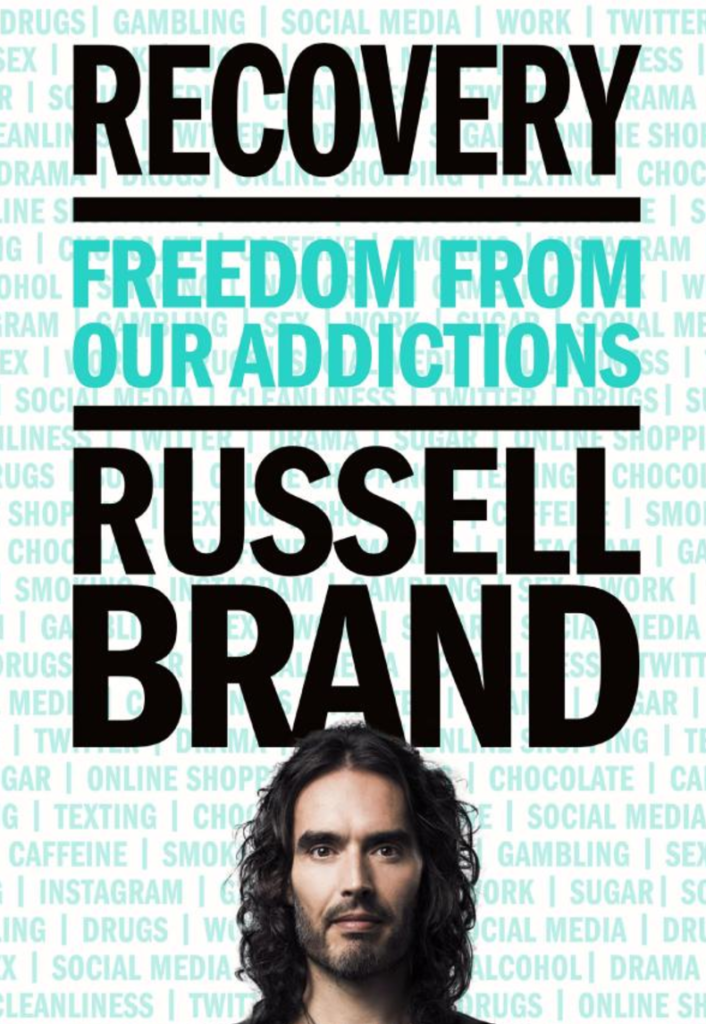I just spent the past couple of hours listening to Recovery: Freedom From Our Addictions by Russell Brand (the audiobook version, narrated by him).
So far, the book explains his experience being a recovering addict using the 12 steps for many years. I think he said 14 years?
I feel compelled to share this book with you guys for a few reasons.
I attended 12-step meetings for a number of years, from 2007 to 2012 (I’m no longer “in the program,” but I’m grateful for what I learned there and the amazing people I met through it).
In the book, Russell does take the traditional 12 steps and outlines them with his personal experience and point of view. I assumed (and I’ve noticed in a couple of reviews), that some 12-step members would take issue with the way he presents it (because it’s not “official” 12 step literature, etc), but I find this book to be really important.
When I was first introduced to a 12 step recovery program, we didn’t really have the internet like we do today. Meaning, I couldn’t really just Google anything I wanted to know about recovery and expect to see much. Sure, there was information online, but nothing like there is now (a million blogs, opinions, forums, resources, books, evvvvvverything). So the information and experiences I heard about 12 step recovery came exclusively from the people I encountered at meetings. We weren’t encouraged to spread public information about it (i.e. “break our anonymity”) or expose anyone else’s anonymity, so there wasn’t much public discourse about it on the internet at the time.
I completed the 12 steps with 2 different sponsors (or “mentors” as Russell calls them in the book), and I “mentored” 2 different women through the steps. And as we all began to clean up our resentments, learned to support each other, began to believe there was another way to live and that we can’t do this alone, I remember thinking “I wish everyone had some kind of ‘program’ to follow – not just the people who identify as addicts of some kind.”
Most people who don’t have an addiction that’s causing a lot of obvious life damage won’t ever be inclined to walk into a 12 step meeting on their own or pick up any traditional 12 step literature, because of stigma or shame or not actually wanting to admit that something’s an issue. So with this book, I have a feeling an entire population of people will be helped and will receive guidance that might not normally reach out for help- but in a way that’s more accessible, more for the curious, and (seemingly) less dogmatic than other 12-step litrature. I’m not knocking 12-step programs (at all), they are fantastic for many people, but there were things about it that just didn’t work for me at the time, and I would have loved if someone handed me this book back then. So far, I also like that he doesn’t much “program lingo” — I know it’s just language, but I also know that certain language can alienate people from actually hearing the helpful tidbits.
The other reason I’m glad he wrote this book is because I remember feeling like there was only “one way” to do it, and I rebelled so hard against that idea (still do). He presents 12 step recovery with a really open viewpoint, which is important for rebellious people. Although he does recommend people find traditional 12-step groups to join if they really want to do the steps, I wish someone had told me that it’s ok to question things, or that the specific way people go about things in 12-step meetings isn’t the absolute only way to approach living a better life. That wasn’t the message I heard when I was going through it, so for me, this is a breath of fresh air. Because as he says in the book, we’re all on the spectrum of addiction somewhere, even if we don’t identify “enough” as an addict to step into a meeting. And that’s where this book might help give some tools to people who are curious about changing things.
“Pain is a signal, it’s some aspect of us that’s beyond our somewhat narrow conception of ‘self,’ communicating. A pain in the leg means ‘don’t put pressure on this leg’; a pain in the mind means ‘change the way you live’.“

The ideas in this book can help anyone learn more about their addictive/destructive behavior and learn to live a life of more freedom, and it reminds me that no matter what kind of “program” we follow in life, we need to support each other and we simply can’t do this alone. I have a lot more to say about this topic, and I will one day, but for now I just wanted to share the link in case it could be helpful to someone.
I haven’t finished it yet so I can’t really give a full assessment, but so far I think it’s honest and non-judgmental and could offer up a few helpful pieces of insight about suffering and how to find a little relief.
Talk soon…
xx
Jenny



Tasha | Unjunkiefied says
I liked this post. As a woman in recovery, I find it interesting to read other people’s views on the 12 step program and recovery. Personally, I don’t like the 12 step way what so ever and I don’t like what Russel Brand has to say about medicine-assisted treatment. I am a strong believer that everyone needs to recover in their own way. There is no right or wrong way to recover. And no matter how bad your active addiction seems, you can recover. I have been in the rooms many times and did the whole thing and it just isn’t for me. Although, it does work for some. I feel inclined to read this book now because of the things you have pointed out. I am super curious now because anything I have ever read about Russel Brand has led me to believe that he believes 12 step is the only recovery. It looks like I am wrong. lmao (I am wrong more often that I’d like to admit) I look forward to reading more of your blog. As my blog’s focus was basically on an addiction recovery lifestyle but, 2018 has brought about change and it will be more about creating the best version of yourself after overcoming your past struggles. Thank you for this post! This blog looks amazing, can’t wait to dive in. Have a great year!